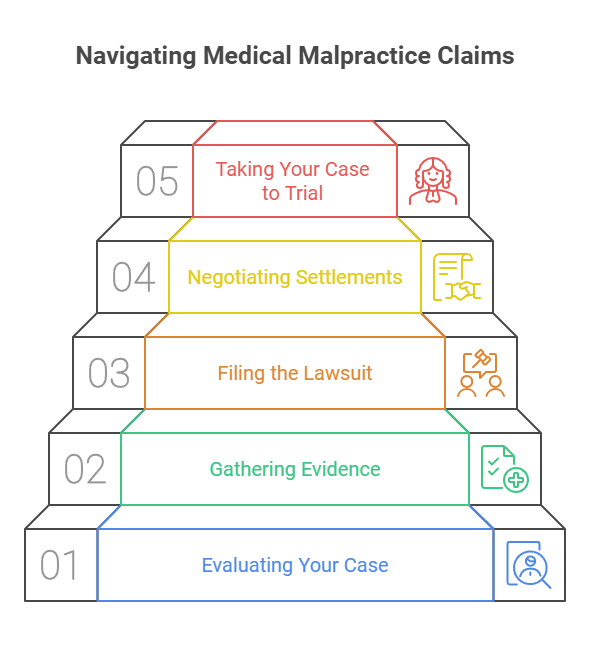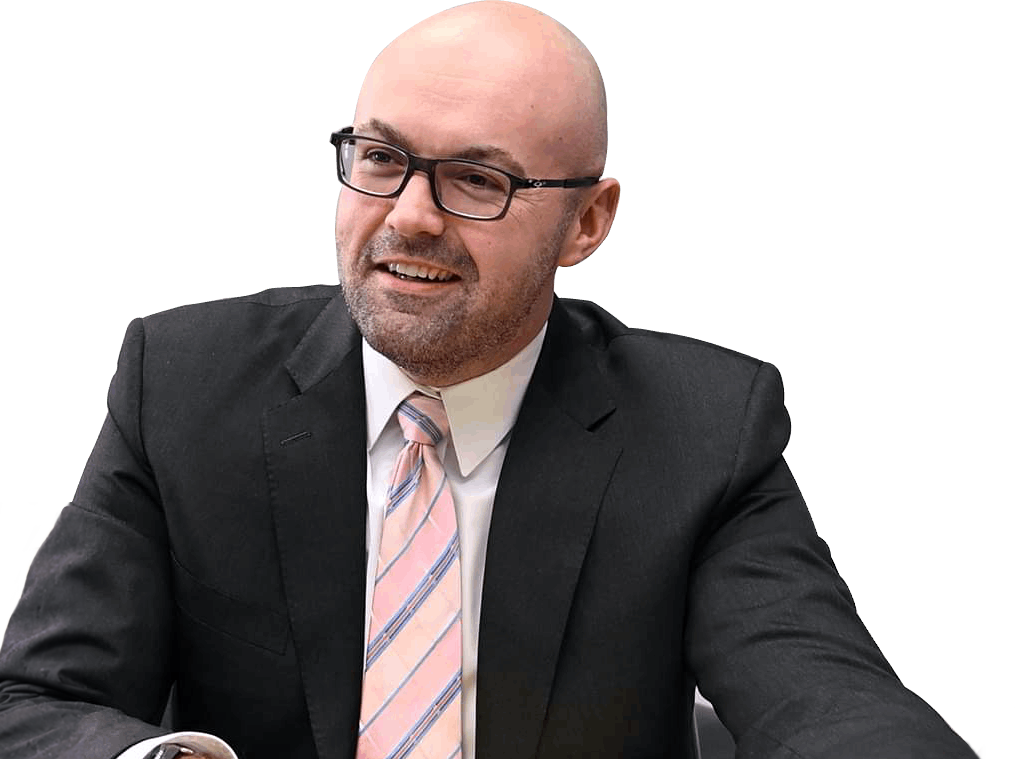When orthopedic surgery goes wrong, the results can be devastating. The effects are capable of changing your life forever. If you have suffered from an orthopedic surgery error, it is time to understand your legal rights.
In such cases, you must seek compensation for your pain and suffering. Our experienced orthopedic surgery error lawyer in Chicago is here to help you understand your rights as a victim, build a strong case, and fight for justice!
What is Orthopedic Surgery Errors
Orthopedic surgery errors can happen at various stages of the surgical process. It can happen during pre-operative planning, intraoperative procedures, and aftercare.
Medical surgery errors are a significant concern, with wrong-site surgeries (WSS) being among the most critical. Common types of orthopedic surgery errors in Chicago are:
- Wrong-Site Surgery: Performing surgery on the wrong part of the body or on the wrong patient.
- Surgical Instrument Errors: Leaving surgical instruments or sponges inside the patient’s body.
- Nerve Damage: Permanent nerve damage caused by improper surgical techniques.
- Infection: Failing to maintain a sterile environment leads to post-operative infections. A nursing home infection lawyer investigates cases involving infections caused by poor hygiene.
- Anesthesia Errors: Administering incorrect dosages or types of anesthesia, resulting in complications or death. Chicago anesthesia error lawyers handled many cases involving complications or injuries resulting from anesthesia mistakes.
- Failure to Diagnose: Not identifying and treating complications such as blood clots or deep vein thrombosis (DVT). Failure to treat lawyers focuses on cases where medical professionals did not provide necessary care.
- Post-Surgical Care Errors: Failure to properly monitor or care for the patient after surgery, leading to complications like blood clots or poor healing.
- Improper Surgical Technique: Using an outdated or incorrect surgical technique can lead to suboptimal outcomes, including improper healing, pain, or further injury.
Why You Need Our Orthopedic Surgery Errors Lawyer
An malpractice attorney‘s claim is more complicated than it seems. It requires a deep understanding of medical and legal fields. Our orthopedic surgery errors lawyer in Chicago specializes in this unique area of law and can be your strongest support.
Here’s how a Chicago Injury Lawyer can serve you:
1. Evaluating Your Case
To seek justice, the first step is to determine if you have a valid medical malpractice claim. Our lawyer will review your medical records, consult experts, and examine your case to identify errors or negligence. This helps confirm if the care you received was below standard.
2. Gathering Evidence
Medical malpractice cases require substantial evidence. Your lawyer will work to collect all relevant documentation, including surgical records, imaging studies, and expert testimonies. It establishes a clear connection between the error and your injury.
3. Filing the Lawsuit
In Illinois, medical malpractice lawsuits are governed by specific statutes and procedural rules. Our attorney will ensure your claim is filed within the statute of limitations. It is typically two years from the date you discovered the injury. They will handle all legal filings and communications with opposing parties.
4. Negotiating Settlements
In many cases, medical malpractice claims are resolved through settlements rather than going to trial. Our lawyer will negotiate aggressively to secure fair compensation for your damages.
5. Taking Your Case to Trial
If a fair settlement cannot be reached, our attorney will be prepared to present a strong case in court. They will advocate for your rights, ensuring your story is heard, and justice is served.

Common Causes of Orthopedic Surgery Errors
According to The Joint Commission’s medical error statistics, the top contributing factors to wrong-site surgeries are failure to follow protocol (83.8%) and inability to review medical records (41.4%).
Several other factors also contribute to different orthopedic surgical errors:
- Lack of Experience: Orthopedic surgeons of Chicago who lack the necessary skills or experience to perform complex procedures.
- Inadequate Preparation: Failure to properly prepare for surgery, including misreading medical records, incomplete pre-surgical assessments, or rushing through the process.
- Poor Communication: Miscommunication among surgical team members regarding the patient’s condition or surgical plan.
- Inadequate Preoperative Planning: Failing to thoroughly assess the patient’s medical history and potential risk factors.
- Technical Errors in Surgery: Mistakes made while using surgical instruments or technology.
- Systemic Issues: Inadequate hospital policies and procedures that do not adequately prevent or address errors.
- Fatigue or Distraction: Surgeons and other medical staff working long shifts or dealing with distractions may be more prone to making mistakes.
Our Advice For Recognizing Orthopedic Surgery Errors
After orthopedic surgery, most patients expect to recover and return to their normal activities. However, it may not always be immediately apparent if something goes wrong.
Here are some signs of an orthopedic surgery we observed in our clients:
- Unexplained Pain or Discomfort:
If your pain level has not improved or has worsened after surgery, it could indicate that something went wrong.
- Infection:
Signs of infection, including fever, increased redness or swelling at the surgical site, or drainage, may suggest improper sterilization.
- Numbness or Weakness:
Nerve damage during orthopedic surgery can cause numbness, weakness, or a loss of sensation in the affected area.
- Movement Problems:
If you have difficulty moving the treated area, it may indicate that the procedure was unsuccessful.
- Scarring or Deformities:
Improperly performed surgeries can result in visible deformities, scars, or misalignment not part of the original surgical plan.
- Inability to Use the Limb or Joint Properly:
If you experience issues with mobility or strength in the operated area that you did not have before, it is a potential sign of error.
- Delayed Recovery:
If your recovery takes much longer than expected, it may be time to investigate whether a surgical error occurred.
If you believe your orthopedic surgery was not performed correctly, inquire our orthopedic surgery errors lawyer in Chicago immediately.
Steps to Take if You Suspect an Orthopedic Surgery Error
Surgical errors are a significant cause of medical malpractice incidents in Chicago. These mistakes can lead to longer recoveries, extra surgeries, and unnecessary pain.
If you are a victim, taking the following steps is necessary to protect your rights:
- Seek Medical Attention:
Your health is the top priority. Consult with another medical professional to address any complications and document your condition.
- Obtain Medical Records:
Request copies of your medical records, including surgical notes, imaging studies, and post-operative care instructions. These documents will be critical in proving your case.
- Document Your Experience:
Keep a detailed record of your symptoms, treatments, and the impact of the error on your daily life. Photographs, journals, and receipts can all serve as evidence.
- Avoid Speaking with Insurance Companies:
Do not provide statements to insurance companies without consulting an attorney. Anything you say could be used to devalue your claim.
- Contact an Experienced Lawyer:
The sooner you consult with our qualified orthopedic surgery errors lawyer, the better. They can guide you through the legal process and secure your rights.

Compensation for Orthopedic Surgery Errors in Chicago
Illinois laws provide strong support for victims of medical malpractice through specific acts. These laws recognize the devastating impact of surgical errors. Victims can claim damages for economic and non-economic losses under the Medical Malpractice Act (735 ILCS 5/2-622).
With approximately 17,000 medical malpractice claims filed annually in the U.S., Illinois remains a state where victims have a clear legal path to justice.
Economic Damages
Economic damages cover measurable financial losses, such as medical bills, lost wages, and future healthcare costs. Under Illinois law, victims can recover these costs without a limit, ensuring total compensation for their financial burdens.
Under the Medical Malpractice Statute of Limitations (735 ILCS 5/13-212), it must be filed within two years of discovering the injury and no later than four years after the surgical error.
Non-Economic Damages
Non-economic damages address intangible losses, including pain, suffering, emotional distress, and loss of enjoyment of life.
Victims can seek total compensation for these life-altering damages. Claims must adhere to the same time frame as economic damages, two years from discovery and no more than four years post-injury.
Punitive Damages
Punitive damages are awarded in rare cases where the healthcare provider’s actions were grossly negligent or intentionally harmful. These damages aim to punish the wrongdoing and deter similar future behavior.
Although Illinois has no specific restrictions on punitive damages, courts evaluate the allegations carefully. Claims must meet the filing deadlines of two years.
Consult a knowledgeable attorney to determine if your case qualifies for punitive damages.
How Much Does It Cost to Hire an Orthopedic Surgery Error Lawyer in Chicago?
Orthopedic surgery errors can lead to life-altering consequences—like permanent mobility loss, nerve damage, or chronic pain. If you suspect a surgical mistake or misdiagnosis caused your injury, hiring an experienced orthopedic surgery error lawyer in Chicago typically comes with no upfront costs. Most reputable firms handle these complex cases on a contingency fee basis, which means you only pay if your lawyer wins compensation for you. Legal fees generally range between 33% and 40% of the final recovery, and the initial consultation is always free.
Orthopedic Surgery Error Cost Calculator (Illinois)
Disclaimer: Estimates are non-binding and may vary based on actual legal engagement and case specifics.
Advocate for Your Rights Today!
Orthopedic surgery errors can have life-altering consequences, but we have your back. With the guidance of our orthopedic surgery errors lawyer in Chicago, you can hold negligent parties accountable and secure the compensation to move forward.
Contact our trusted legal advocate today to schedule a free consultation and take the first step toward justice!
Frequently Asked Questions
Do I need an expert witness to prove my orthopedic surgery error case?
Yes, Illinois law requires a medical expert to confirm that the surgeon’s actions did not meet the standard of care. Your lawyer will collaborate with qualified experts to build your case and show that the error caused your injuries.
Can I claim damages for emotional distress after an orthopedic surgery error?
Yes. Emotional distress, pain, and suffering are part of non-economic damages. If you’ve experienced anxiety, depression, or a loss of enjoyment in life as a result of the surgical error, you are entitled to compensation.
What if the surgery was a success, but I still suffered complications?
Not all complications after surgery result from errors, but if the complications were caused by surgical mistakes or negligence, you may have a case.



